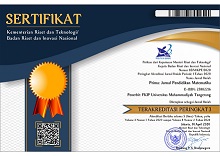THE IMPACT OF QUESTION BOARDS-ASSISTED TALKING STICK LEARNING MODEL ON GRADE IV ELEMENTARY SCHOOL STUDENTS MATHEMATICS LEARNING OUTCOMES
Abstract
Keywords
Full Text:
PDFReferences
Anggi Seika Ayuni, I., Kusmariyatni, N., & Gst Ngurah Japa, I. (2017). The Effect of the Talking Stick Learning Model Assisted by Media Question Box on Science Learning Outcomes in Class V. In Journal of Education Technology (Vol. 1, Issue 2). https://doi.org/10.23887/jet.v1i3.12503
Arsyad, M. N., & Fatmawati, D. (2018). Application of Interactive Multimedia-Based Learning Media to IKIP Budi Utomo Malang Students. Agastya Journal (Vol. 8). http://doi.org/10.25273/ajsp.v8i2.2702
Bahak Udin By Arifin, M., & Nur Laili, D. (2022). The Effect of the Talking Stick Type Cooperative Learning Model on the Critical Thinking Ability of Grade 4 Students in Mathematics Subjects. Scientific Journal of Basic Education, 7(2). https://doi.org/10.23969/jp.v7i2.5877
Baid, N., Hulukati, E., Usman, K., & Zakiyah, S. (2022). Application of the Talking Stick Learning Model to Improve Students' Mathematics Learning Outcomes on Social Arithmetic Material. Euler : Scientific Journal of Mathematics, Science and Technology, 10(2), 164–172. https://doi.org/10.34312/euler.v10i2.16342
Fadilla, A. N., Relawati, A. S., & Ratnaningsih, N. (2021). Problems of Online Mathematics Learning during the Covid-19 Pandemic. Journal of Education Window, 01(2). https://doi.org/10.57008/jjp.v1i02.6
Handayani, M. W., Swistoro, E., & Risdianto, E. (2018). The Effect of the Physics Problem Solving Learning Model on the Concept Mastery and Problem Solving Ability of Class X Students of MIPA SMAN 4 Bengkulu City (Vol. 1, Issue 3). https://doi.org/10.33369/jkf.1.3.36-44
Hasrudin, F., & Asrul. (2020). The Effect of the Talking Stick Type Cooperative Learning Model on Student Learning Outcomes in Science Lessons at SD Inpres 16, Sorong Regency. Papeda Journal, 2(2). https://doi.org/10.36232/jurnalpendidikandasar.v2i2.521
Jamiah R, E. S. (2016). The Effect of the Talking Stick Learning Model with the Math Magic Method on Mathematics Learning Outcomes on the Subject of Cubes and Blocks in Class V of SD Negeri 200211 Padang Sidimpuan. AXIOM Journal, 5(2). http://dx.doi.org/10.30821/axiom.v5i2.420
Nafisah, S., Furnamasari, Y. F., Education, J., 15, N., Wetan, C., Cileunyi, K., Bandung, K., & Barat, J. (2023). Application of Smart Board Learning Media in Second Grade Mathematics Learning Uptd Sdn 1 Juntinyuat. Journal of Educational Inspiration (ALFIHRIS), 1(3), 208–216. https://doi.org/10.59246/alfihris.v1i3.360
Palimbong, J., & T Allo, A. Y. (2018). Item Analysis Using Rasch Model in Semester Final Exam Evaluation Study Subject in Physics Class X TKJ SMK Negeri 2 Manokwari Analisis Butir Soal Menggunakan Model Rasch pada Ujian Evaluasi Belajar Akhir Semester Mata Pelajaran Fisika Kelas X TKJ SMK Negeri 2 Manokwari. Physics Education Journal, 1(1), 43–51. https://doi.org/10.37891/kpej.v1i1.40
Putu, O. I., & Suhardiana, A. (2018). Talking Stick Learning Model as a Support for English Vocabulary Mastery in Early Childhood. Jurnal Pratama Widya, 3(1). https://doi.org/10.25078/pw.v3i1.704
Rahmawati, N. I., & Sutiarso, S. (2019). Cooperative learning as an effective model to develop interaction and communication between teachers and students. Exponential Journal, 9(2), 10–19. https://doi.org/10.47637/eksponen.v9i2.55
Saragih, L. M., Tanjung, D. S., & Anzelina, D. (2021). The Effect of the Open Ended Learning Model on Student Learning Outcomes on Thematic Learning. Basicedu Journal, 5(4), 2644–2652. https://doi.org/10.31004/basicedu.v5i4.1250
Sari, A., & Permata Azmi, M. (2018). Application of the Two Stay Two Stray (TSTS) Type Cooperative Model to Mathematical Communication Skills. Journal of Scholars: Journal of Mathematics Education, 2(1), 164–171. https://doi.org/10.31004/cendekia.v2i1.42
Sukendra, K., Komang, N., & Yuliastini, S. (2019). Analysis of parents' education level, learning motivation, and problem-solving ability on mathematics learning outcomes. Jurnal Widyadari, 20(2). https://doi.org/10.5281/zenodo.3516990
Susanto, A. (2013). Learning Theory and Learning in Elementary Schools. Jakarta: Kencana Prenada Media Group.
Surya, E., & Khairunnisa. (2017). Improve the Learning Outcomes of Mathematics through the Learning Model of Talking Stick in the Fifth-Grade of Public Primary School 060843 of Medan Barat. International Journal of Sciences: Basic and Applied Research (IJSBAR) International Journal of Sciences: Basic and Applied Research, 34(1), 81–90. Retrieved from https://www.gssrr.org/index.php/JournalOfBasicAndApplied/article/view/7533
Wahyudi, A. A., & Hadaming, H. (2020). The Effect of the Application of the Talking Stick Learning Model on the Improvement of Mathematics Learning Outcomes in Elementary Schools. Journal of Basic Education Research, 3(1). Retrieved from http://journal.unismuh.ac.id/index.php/jrpd
Wassahua, S. (2016). Analysis of Students' Learning Styles on Mathematics Learning Outcomes in Grade VII Student Assembly Materials of Karang Jaya State Junior High School, Namlea District, Buru Regency. Journal of Mathematics and Learning, 2(1). https://dx.doi.org/10.33477/mp.v4i1.310
Wiryanto. (2020). The Mathematics Learning Process in Elementary Schools in the Midst of the Covid-19 Pandemic. Journal of Basic Education Review, 6(2). https://doi.org/10.26740/jrpd.v6n2.p125-132
DOI: http://dx.doi.org/10.31000/prima.v8i3.11800
Article Metrics
Abstract - 577 PDF - 470Refbacks
- There are currently no refbacks.
Prima: Jurnal Pendidikan Matematika
Program Studi Pendidikan Matematika
Fakultas Keguruan dan Ilmu Pendidikan
Universitas Muhammadiyah Tangerang
Jl. Perintis Kemerdekaan I/33, Cikokol
Kota Tangerang, Indonesia
e-mail: primajpm@gmail.com
Prima: Jurnal Pendidikan Matematika (p-ISSN: 2579-9827 | e-ISSN: 2580-2216) is licensed under a Creative Commons Attribution 4.0 International License.







